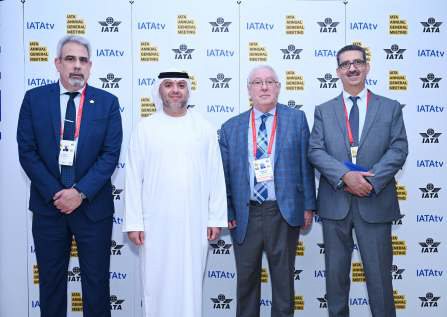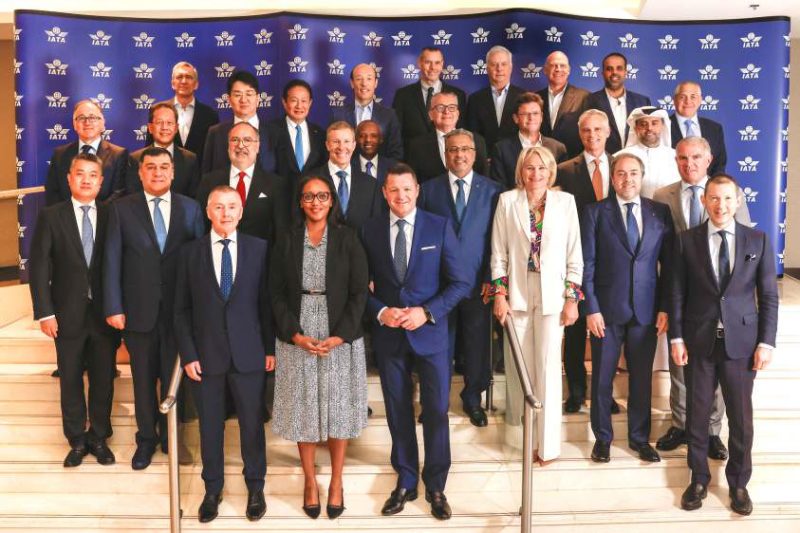Aviation leaders gather in Dubai for IATA's 80th AGM and World Air Transport Summit
About 3 million people worldwide are directly employed in the aviation sector. The travel and tourism value chain suppos some 320 million jobs and accounts for about 10% of all economic activities. While the air cargo industry delivers $8.3 trillion of trade annually—some 35% of total global trade.
Leaders of the global airline industry gathered in Dubai for the 80th Annual General Meeting of the International Air Transport Association (IATA) which represents 336 carriers, and the World Air Transport Summit (2-4 June 2024).
The event was held in the UAE for the first time and hosted by Emirates Airline. More than 1,500 participants were in attendance, including industry leaders, government officials and representatives from some 200 media across the world.
H.E. Abdulla bin Touq Al Marri, Minister of Economy for the United Arab Emirates warmly welcomed the delegates to Dubai.
The benefits of global connectivity were highlighted throughout the entire event. Globally, aviation directly employs 3 million people and is a key enabling part of the travel and tourism value chain which supports some 320 million jobs and accounts for about 10% of all economic activity. Moreover, air cargo delivers $8.3 trillion of trade annually—some 35% of total trade.
For Dubai, Oxford Economics estimates that aviation contributed 27% to Dubai’s GDP and supported $37 billion in gross value added in 2023. This is projected to increase to $53 billion dollars in 2030, in line with Dubai’s growth.

World Air Transport Summit and SAF Goals
The World Air Transport Summit (WATS) immediately followed the AGM for a comprehensive program addressing critical issues facing aviation.
IATA announced it will establish the SAF Registry (Registry) to accelerate the uptake of Sustainable Aviation Fuels (SAF) by authoritatively accounting and reporting emissions reductions from SAF.
17 airlines, one airline group, six national authorities, three Original Equipment Manufacturers (OEMs), and one fuel producer are already supporting the effort to develop the Registry. The Registry is expected to launch in the first quarter of 2025.
SAF is expected to account for up to 65% of the total carbon mitigation needed to achieve net zero carbon emissions in air transportation by 2050.
“SAF is key to aviation’s decarbonization. Airlines want more SAF and stand ready to use every drop of it. The SAF Registry will help meet the critical needs of all stakeholders as part of the global effort to ramp-up SAF production. Governments need a trusted system to track the quality and quantities of SAF used. SAF producers need to accurately account for what has been delivered and effectively decarbonized. Corporate customers must be able to transparently account for their Scope 3 emissions. And airlines must have certainty that they can claim the
environmental benefits of the SAF they purchased. The Registry will meet all these needs. In doing so, the Registry will help create a global SAF market by ensuring that airlines have access to SAF wherever it is produced, and that SAF producers have access to airlines regardless of their location,” said Willie Walsh, IATA’s Director General.
Sustainable Aviation Fuels (SAF) production in 2024 to 1.9 billion liters (1.5 million tons) are on track. This would account for 0.53% of aviation’s fuel need in 2024. To accelerate SAF use, there are several policy measures that governments could take, IATA said.
Some 140 renewable fuel projects with the capability to produce SAF have been announced to be in production by 2030. If all of these proceed to production as announced, total renewable fuel production capacity could reach 51 million tons by 2030, with production capacity spread across almost all regions.

Passenger traffic keeps growing, fueling profits for airlines
IATA said passenger demand has steadily grown for the past three years or 36 months. In April 2023, passenger traffic was up 11 percent compared to the same month in 2022 with a load factor of 82.4%. With passenger traffic continually growing, some airlines have posted strong profits during the period.
IATA Outlook highlights
Net profits are expected to reach $30.5 billion in 2024 (3.1% net profit margin). That will be an improvement on 2023 net profits which are estimated to be $27.4 billion (3.0% net profit margin). It is also an improvement on the $25.7 billion (2.7% net profit margin) forecast for 2024 profits that IATA released in December 2023.
Return on invested capital in 2024 is expected to be 5.7%, which is about 3.4 percentage points (ppt) below the average cost of capital.
Operating profits are expected to reach $59.9 billion in 2024, up from an estimated $52.2 billion in 2023.
- Total revenues are expected to reach $996 billion (+9.7%) in 2024—a record high.
- Total expenses are expected to reach $936 billion (+9.4%) in 2024—a record high.
- Total travelers are expected to reach 4.96 billion in 2024—a record high.
- Total air cargo volumes are expected to reach 62 million tons in 2024
81st AGM and WATS to be held in India
Pieter Elbers, CEO of IndiGo, has assumed his duties as Chair of the IATA Board of Governors (BoG). His one-year term began at the conclusion of the 80th IATA Annual General Meeting in Dubai, United Arab Emirates, on 3 June.
IndiGo will host the 81st IATA Annual General Meeting (AGM) and World Air Transport Summit in Delhi, India, on 8-10 June 2025.
“IndiGo is proud to be host airline for the 81st IATA AGM and looks forward to welcoming the global aviation community to Delhi in 2025. India, becoming the third largest economy within the next few years and leading the fourth industrial revolution with the use of AI, is a nation on the move. India’s rise in the global aviation landscape over the last years has been nothing short of remarkable,” said Elbers.














